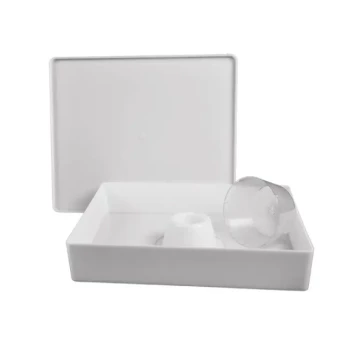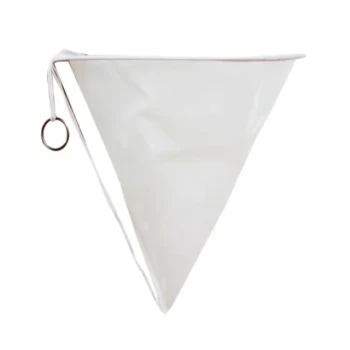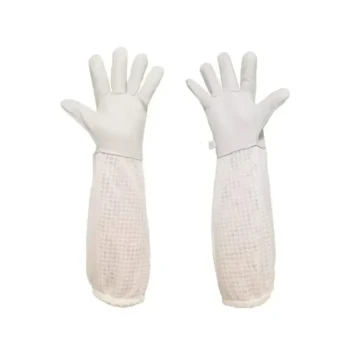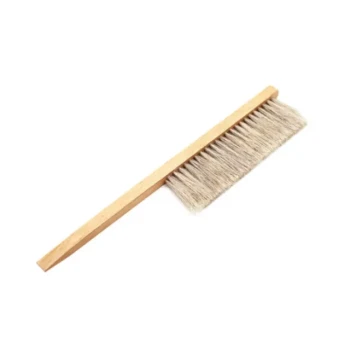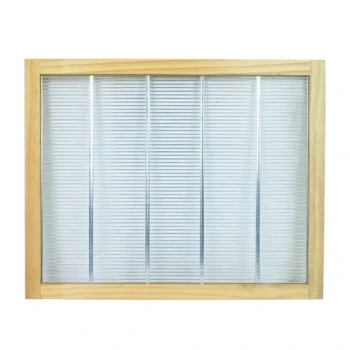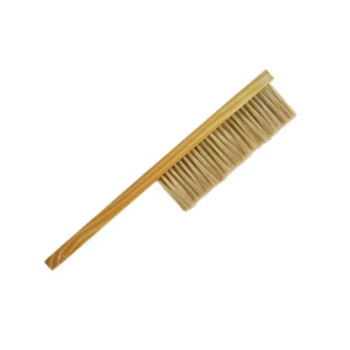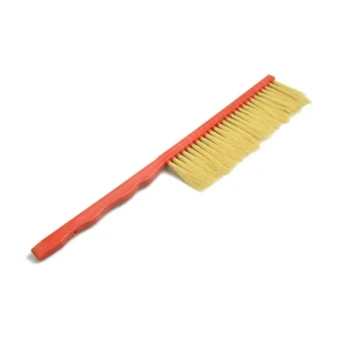At their core, insulated beehives provide a more stable internal environment for your bees, acting much like a climate-controlled home. By buffering the colony from extreme external temperatures and managing humidity, these hives reduce the immense energy bees must expend on thermoregulation, allowing them to focus on brood rearing, foraging, and honey production.
The fundamental benefit of an insulated hive is not just about keeping bees warm in winter or cool in summer. It's about reducing colony stress, which allows the bees to redirect their energy from mere survival towards productive activities, resulting in a stronger, healthier, and more resilient colony.
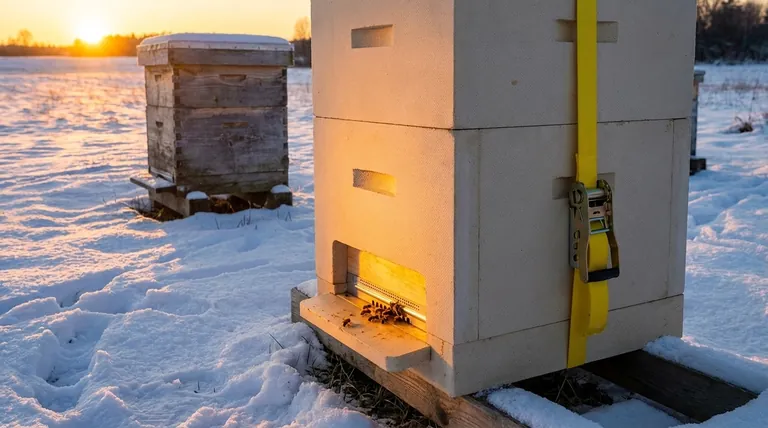
The Core Principle: Reducing Colony Stress
A bee colony's primary, non-negotiable job is maintaining the brood nest at a stable temperature, typically around 95°F (35°C). In a traditional, thin-walled wooden hive, this is an enormous energy drain during temperature extremes.
Superior Temperature Regulation
Insulated hives, often made from high-density polyurethane foam, have much higher thermal resistance (R-value) than wood. This material acts as a buffer, slowing heat transfer significantly.
In winter, this means the colony's own metabolic heat is retained far more effectively, requiring less work and honey consumption to stay warm. In summer, the insulation protects the colony from scorching outside heat, reducing the need for exhaustive fanning and water collection to cool the hive.
Better Moisture Management
Condensation is a major threat to overwintering colonies. As the bees' warm, moist breath hits a cold inner cover, it condenses into water droplets that can drip down and chill the cluster, leading to death.
Because the interior walls of an insulated hive stay warmer, the dew point is less likely to be reached inside the hive. This drastically reduces condensation, keeping the colony dry and healthy through the winter.
The Energy Dividend
A colony that isn't burning through its resources to fight the external environment has an "energy dividend" to spend elsewhere.
This surplus energy is directly re-invested into core tasks that benefit the colony and the beekeeper: raising more brood, expanding the workforce, and foraging more efficiently to produce more honey.
Tangible Benefits for the Beekeeper
Reducing colony stress translates directly into measurable advantages for both hobbyist and commercial apiarists.
Potentially Higher Honey Yields
A larger, healthier workforce with more available energy can forage more effectively. While not a guarantee, insulated hives create the ideal conditions for a colony to maximize its honey production potential.
Improved Winter Survival Rates
For beekeepers in colder climates, winter losses are a significant financial and emotional burden. By providing superior temperature control and reducing fatal condensation, insulated hives can dramatically increase a colony's chance of surviving the winter.
Lighter and More Ergonomic
Many modern insulated hives are made of lightweight polyurethane. This makes lifting hive bodies and supers significantly easier on the beekeeper's back compared to heavy wooden equipment, a major advantage for any beekeeper managing multiple hives.
Understanding the Trade-offs and Realities
While beneficial, an insulated hive is a tool, not a magic bullet. It's crucial to understand what it does and does not do.
Insulation Is Not a Substitute for Good Beekeeping
An insulated hive will not manage varroa mites, prevent swarming, treat diseases, or requeen a failing colony for you. Core beekeeping responsibilities—regular inspections, pest and disease management, and ensuring adequate food stores—remain just as critical.
Initial Cost vs. Long-Term Value
Insulated hives typically have a higher upfront purchase price than standard wooden Langstroth hives. This cost should be weighed against the long-term value of reduced winter losses, potentially higher honey yields, and less frequent need to replace dead-out colonies.
Differentiating Modern Features
Some modern hives combine insulation with other features, like smart sensors or unique harvesting systems. It's important to differentiate these. The core benefit of insulation is thermoregulation. Other features solve different problems and should be evaluated on their own merits.
Making the Right Choice for Your Apiary
The decision to use insulated hives depends on your specific goals, climate, and management style.
- If your primary focus is improving colony health and winter survival: An insulated hive is one of the most effective investments you can make to reduce stress and increase resilience.
- If your primary focus is maximizing honey production for a commercial operation: The potential for higher yields and lower winter losses can provide a clear return on the initial investment.
- If your primary focus is making beekeeping less physically demanding: The lightweight nature of many insulated hive models offers a significant ergonomic advantage over traditional wood.
Ultimately, choosing an insulated hive is an investment in the long-term health and stability of your bees.
Summary Table:
| Benefit | Backyard Beekeeper | Commercial Beekeeper |
|---|---|---|
| Improved Winter Survival | Higher success rate, less colony replacement | Lower financial losses, stable workforce |
| Potential Honey Yield Increase | More honey for personal use or local sales | Higher production volume and profitability |
| Reduced Bee Stress | Healthier, more resilient colonies | Stronger foragers, more consistent performance |
| Ergonomic & Lightweight | Easier hive management for hobbyists | Faster, less strenuous inspections for large apiaries |
Ready to build a more resilient and productive apiary?
At HONESTBEE, we supply high-quality, durable insulated beehives and beekeeping equipment designed for the demands of commercial apiaries and distributors. Our wholesale-focused operations ensure you get the reliable gear you need to support stronger colonies and improve your bottom line.
Contact our team today to discuss your needs and explore our wholesale catalog.
Visual Guide
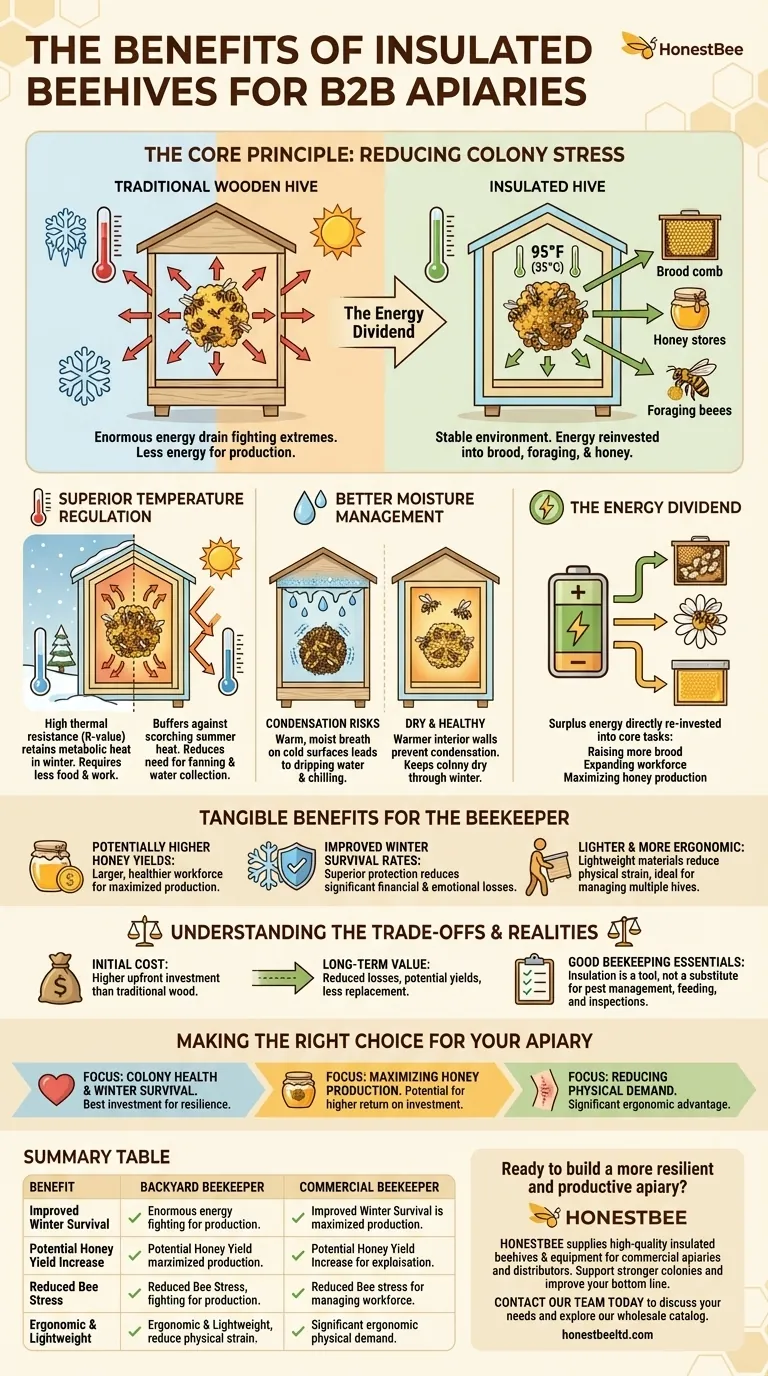
Related Products
- Professional Galvanized Hive Strap with Secure Locking Buckle for Beekeeping
- HONESTBEE Professional Hive Top Bee Feeder Feeding Solution
- Langstroth Screen Bottom Board for Beekeeping Wholesale
- Boardman Entrance Bee Feeder Durable Galvanized Steel and Wood Construction for Beekeeping
- Endless Loop Ratchet Hive Strap
People Also Ask
- What are the technical advantages of using insulated hives in tropical or desert climates? Boost Colony Survival Now
- Is polystyrene toxic to bees? The Hidden Threat to Colony Health
- What are the technical advantages of using polystyrene beehives? Optimize Colony Health with Superior Insulation
- How does insulation benefit beehives in warmer climates? Boost Honey Production & Colony Health
- What role does a polystyrene outer coating play for bumblebee hives in early spring? Boost Colony Survival & Growth
- Why Compare Wooden vs. Polystyrene Beehives for Overwintering? Essential Insights for Colony Survival
- What are the advantages of using polystyrene material for beehive construction in honey bee research? Enhance Precision
- What are the advantages of polystyrene hives for beekeeping? Boost Colony Health & Honey Yields

